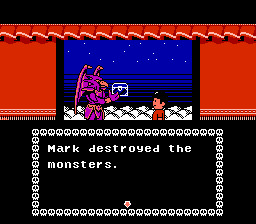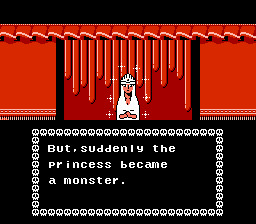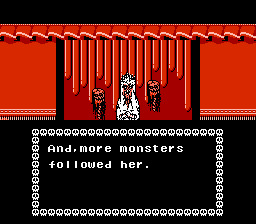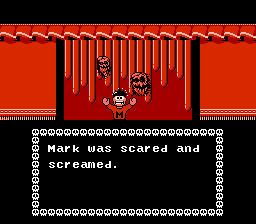#nes monster party
Explore tagged Tumblr posts
Text
An Introduction(Spoilers for Pikmin 1, 2 & 4)[18+]

Screenshot sourced from Pikipedia Screenshot credited to Kirbys-adventure(Uploaded Aug. 5th, 2017)
On August 30th, 2004, Pikmin 2 was released in North America.
I turned nine the same day.
I wouldn't play it until Christmas 2005, and by that point I'd already played the first game, which I was terrible at and kept getting stuck in the third area. I still got a lot of mileage out of it, though, doing the same thing I did for every video game I played: restarting the file to experience the feeling of making progress again.
However, I vividly recall reaching the fourth area during one of these playthroughs and getting pretty excited about it.
That all came to a screeching halt when, on my first day in the area, a bunch of Pikmin I sent back to base started being killed by something, and by the time I got there, the few that remained were already being absorbed into some horrible, dark, blobby creature.
Seeing it freaked me out so bad I turned the game off and quit playing it altogether, thinking it was just an ordinary encounter I was expected to deal with.
It wouldn't be until a couple years later that I learned this enemy is only meant to appear after the player activates it; its presence here was actually a glitch.
Despite my experience, I still wanted the sequel, and given the focus of this account, I felt like providing a video of the intro, along with a written summary of the game's plot.
/\/\/\/\/\/\/\/\/\/\/\/\/\/\/\/\/\/\/\/\/\/\/\/\/\/\/\/\/\/\/\/\/\/\/\/\/\/\/\/\/\/\/\/\/\/\/\/\/\/\/\/\/\/\/\
youtube
Video uploaded by Dustin Bragg(Uploaded Feb. 2, 2008)
Pikmin 2 picks up where the last game ended: with a humanoid alien named Olimar(オリマー) departing the uncharted planet he crash-landed on, and returning to his homeworld of Hocotate. Unfortunately, upon his arrival, he's told the company he works for is going under after one of its newest employees, Louie(ルーイ), lost a shipment of golden carrots to a giant space bunny.
The company's president took out a massive loan to cover the loss, but without a way to repay it all, he's mired the company in debt. Fortunately, an object Olimar found on the uncharted planet is considered valuable enough to pay a bit of it off. With even more such treasures left there to discover, he and Louie are ordered to salvage enough of it until the debt's been paid off.
/\/\/\/\/\/\/\/\/\/\/\/\/\/\/\/\/\/\/\/\/\/\/\/\/\/\/\/\/\/\/\/\/\/\/\/\/\/\/\/\/\/\/\/\/\/\/\/\/\/\/\/\/\/\/\
I probably played the sequel even more than the first despite being even worse at it. I kept getting stuck in the second area and resorted to my "restart method" more frequently than usual.
However, I vividly recall reaching the third area during one of these playthroughs and getting pretty excited about it.
That all came to a screeching halt when, after stepping right outside my base, a giant mechanical spider came out of nowhere and started stomping my Pikmin to death.
For those who don't know, this encounter cannot occur in this area until at least 30 in-game days have elapsed.
It seriously took me at least that long to reach the third area in one of these playthroughs.
Anyone who has played this game, or hell, just watched a typical playthrough of it, will immediately know how ludicrous this is.
You may also be wondering what the hell I spent all that time doing, given there's not much you can do, and I honestly cannot remember. All I remember is the giant spider because it freaked me out so bad I turned the game off and quit playing it altogether.
I eventually went back and beat the first game, but never bothered with the second. I can't say I gained an affinity for either, and once I hit my early twenties, I lost interest in playing video games and preferred just watching others play them online.
/\/\/\/\/\/\/\/\/\/\/\/\/\/\/\/\/\/\/\/\/\/\/\/\/\/\/\/\/\/\/\/\/\/\/\/\/\/\/\/\/\/\/\/\/\/\/\/\/\/\/\/\/\/\/\
Around the same time — in 2014, I believe — I discovered a Tumblr account called Souichi Presents, which featured reviews/overviews of horror stories, primarily the works of Junji Itō(伊藤 潤二). It was run by a guy named Frankie (aka friendlyfrankenstein) who, in 2020, teamed up with a friend of his known as Bugs (aka facefullabugz) to start a streaming channel on Twitch under the account facefullabugs.
I didn't start watching them until early 2023 after seeing this supercut*1 of their 2022 streams made by a person who goes by bubblymiilk, and the first one I watched was for Pikmin 2. I recalled very little about the game and still didn't care for the franchise much, but my familiarity compelled me enough to watch them play it. *1. Uploaded on Jan. 7th, 2023
If you'd like to watch it as well, the VODs have all been uploaded onto their YouTube channel Frankenbug VODs, but (as of the time I'm posting this) you can actually still watch the VODs on Twitch*1 if you prefer! Though, as a heads-up, the first VOD in the series doesn't actually begin with them playing Pikmin 2 but another game called Balan Wonderworld, so if you just want to get right to Pikmin 2, here's a link to 3:41:39 in the stream. *1. All VOD's uploaded on latter date: Stream 1. 1/1/22-1/2/22 Stream 2. 1/3/22-1/4/22 Stream 3. 1/19/22-1/20/22 Stream 4. 2/6/22-2/7/22 Stream 5. 3/14/22-3/15/22 Stream 6. 4/3/22-4/4/22 Stream 7. 5/4/22-5/5/22
However, if you'd like to watch them stream through Balan Wonderworld as well, here's a link to the VOD playlist on YouTube, and here is a link to the VODs*1 on Twitch. *1. All VOD's except first uploaded on latter date: Stream 1. 4/10/21 Stream 2. 4/13/21-4/14/21 Stream 3. 4/19/21-4/20/21 Stream 4. 4/26/21-4/27/21 Stream 5. 1/1/22-1/2/22
/\/\/\/\/\/\/\/\/\/\/\/\/\/\/\/\/\/\/\/\/\/\/\/\/\/\/\/\/\/\/\/\/\/\/\/\/\/\/\/\/\/\/\/\/\/\/\/\/\/\/\/\/\/\/\

Screenshot sourced from Pikipedia Screenshot credited to Waffles(Uploaded May 15, 2017)
While watching Frankie and Bug's playthrough, I recognized that the treasure above was a game for the Disk System, a Japanese-only disk-based add-on for Japan's equivalent to the NES, the Famicom.


Screenshots sourced from Moby Games Screenshot of manual cover credited to Adzuken(Uploaded Feb. 2, 2014) Screenshot of diskette credited to Teran(Uploaded Jan. 25, 2015)
Specifically, it was a copy of The Mysterious Murasame Castle, a (prior to 2014) Japanese-only Nintendo game released on April 14th, 1986.
I'd heard of this game from other sources before, but if I ever realized it appeared in Pikmin 2 before this, I'd totally forgotten. I looked into it a bit more online, and learning it was still a Japanese exclusive back in 2004 got me thinking about topics related to localization, which eventually led me to realize what a dilemma this treasure posed from a localizer's perspective.
The Cosmic Archive is intended to invoke nostalgia from an older demographic familiar with this era of Nintendo's history. Meanwhile, a younger generation might recognize it as an object from a past era.
However, in countries like America, where the Disk System and Murasame Castle hadn't been released, this intent is totally lost on the average person. Additionally, learning this stuff on your own wasn't as easy in 2004, as home computers still weren't too commonplace. Even then, though, knowing what this object is still wouldn't elicit the same response it would for the average person living in Japan, who would grasp its intentions more immediately.
A localizer's (theoretical) goal is to try bridging that cultural gap somehow, but doing so in this context is tricky. I mean, this isn't just a case of translating some text into a new language while capturing the spirit of the original text- it's replacing a whole object with another object that achieves that task.
Of course, this would take considerable time and effort for something so minor that it seemed (to me) like something Pikmin 2's localizers wouldn't even try to attempt. Besides, it's not like localizers always need to go so far, and even if the whole nostalgia angle is lost, the treasure still retains every other aspect ascribed to it in the Japanese script. Sometimes, that's just about the best a translator can do.
The notion, however, made me curious if any other treasures in the North American version remained unlocalized, so I looked up a list of them online, picking the one on Pikipedia.


Screenshots sourced from Pikipedia Both screenshots credited to Mabeloid(Photo A: Sep. 28, 2023|Photo B: Oct. 7, 2023)
That's when I learned a good handful of treasures in the North American version serve as replacements for treasures in the Japanese version. Furthermore, while several of these replacements (like the ones above) merely reuse the same model asset but with a different texture applied each time,


Screenshots sourced from Pikipedia Both screenshots credited to Mabeloid(Photo A: Sep. 29, 2023|Photo B: Oct. 7, 2023)
some are new models with little to no resemblance to their Japanese counterparts.
From this, I presumed the few unlocalized treasures only remained because the CG modelers lacked the time to craft new ones. (Note: I think this might have only been the case for some treasures now, but that's all I'll say about that here.)
These presumptions got me thinking about what these treasures could have been replaced with. However, I found myself simultaneously more intrigued by other details I noticed while going through all the treasures.
/\/\/\/\/\/\/\/\/\/\/\/\/\/\/\/\/\/\/\/\/\/\/\/\/\/\/\/\/\/\/\/\/\/\/\/\/\/\/\/\/\/\/\/\/\/\/\/\/\/\/\/\/\/\/\
First, I need to explain that every piece of treasure is placed into a "Series," and each of those follows a specific theme. For example, the Cosmic Archive is sorted into the "Blast from the Past Series," which revolves around Nintendo games and gaming devices that are (mostly) from the company's past.
However, it seemed to me that within each "Series," many treasures were divided into unspoken sub-series, each revolving around things like conceptual bonds, conceptual contrasts, size differentials, etc.

Screenshot sourced from Pikipedia Screenshot credited to Waffles(Uploaded May 15, 2017)
For example, the Cosmic Archive is paired with the Dream Architect, a recreation of an LCD game Nintendo released back in 1980 titled Ball. To explain how both are connected, however, I'll need to cover another feature of Pikmin 2: the "Treasure Hoard."

Screenshot sourced from Pikipedia Screenshot credited to Twins1105(Uploaded Jul. 18, 2024)
The "Treasure Hoard" is an in-game archive allowing you to view the treasures you've collected, as well as a few statistics on each one.

Screenshot credited to The One and Only: Maker of this Post Uploaded on First Post Day(Well, let's see how this goes.) Screenshot taken of this video by NintendoProductions2(Uploaded Apr. 12, 2015)
Each treasure also has a designated journal entry written by Olimar. These often feature his thoughts on the treasure or just some personal anecdote that's relevant to it in some way.

tsoP eht fo rekaM :ylnO dna enO ehT ot detiderc tohsneercS (?ecnereffid eht topS)yaD sdrawkcaB ylraeN no dedaolpU Screenshot taken of this video by NintendoProductions2(Uploaded Apr. 12, 2015)
Furthermore, your rocket AI will craft a sales pitch for each treasure in a completed "Series."
I mention these because they often enhance whatever binds a particular sub-series. For the treasure I'm focusing on, they help communicate their primary connection: Nintendo devices with features inaccessible to the characters.
In the Cosmic Archive's case, both characters specify how they can't access the data stored on the diskette. With the Dream Architect, they specify that the device is broken, although it's also possible the batteries in it are just dead- if it even has batteries at all. I mean, it's not like the characters would have any idea it needs them, so who's to say.
/\/\/\/\/\/\/\/\/\/\/\/\/\/\/\/\/\/\/\/\/\/\/\/\/\/\/\/\/\/\/\/\/\/\/\/\/\/\/\/\/\/\/\/\/\/\/\/\/\/\/\/\/\/\/\
Both devices are also framed as technologically advanced. The Cosmic Archive's name refers to the rocket AI's belief that it stores all information about the universe. Its sales pitch even states that the contents are inaccessible because the sheer amount of information makes it unprocessable. (It's 112 kilobytes of data…)
The Dream Architect's name also conveys this, though not as clearly in the international versions. In the Japanese version, the treasure's name literally translates to "Dream Ex Machina," which is obviously a play on deus ex machina, which is Latin for 'god from the machine.' It's likely that 'Architect' is being used to substitute this intent, as it invokes God being the creator of all things.
This isn't the only time the English translation obfuscates an association that was a bit clearer in the Japanese version. However, it was likely only done here because they couldn't include anything overtly religious in the translation. (Although the English version of Pikmin 2 does feature something like that, which I'll get into at…some point.)
Also, I feel the need to point out just how self-aggrandizing this is. It is Nintendo framing the devices they've made as some object of reverence; it's hilariously conceited.
Though I will concede, there is some self-awareness to it, as it's implied the rocket AI is just making shit up to make these unusable devices more appealing. Its sales pitch for the Dream Architect basically says: "Yeah, this thing doesn't work, but imagine how cool it'd be if it did!" Even so, I don't doubt there's at least a degree of sincerity here.
/\/\/\/\/\/\/\/\/\/\/\/\/\/\/\/\/\/\/\/\/\/\/\/\/\/\/\/\/\/\/\/\/\/\/\/\/\/\/\/\/\/\/\/\/\/\/\/\/\/\/\/\/\/\/\
There's at least one more potential connection for these two, but it requires a bit of context.

Screenshot sourced from Video Game Sage Screenshot credited to silentmonkee(Uploaded Mar. 31, 2021)
In Japan, Ball was actually the first in a line of LCD devices made by Nintendo collectively called Game & Watch, which could be used as clocks in standby mode.
The first five Game & Watch had silver-colored casings, but starting with the sixth entry, they opted for gold-colored ones.

Screenshot sourced from Video Game Sage Screenshot credited to silentmonkee(Uploaded Mar. 31, 2021)
The aesthetic change also helped mark a few hardware revisions, such as a settable alarm and a foldable kickstand on the back.
The games also offered a fairer challenge by featuring a mistake resetting mechanic. With the silver models, if you screwed up during a play session, it'd be tallied up in a 'Mistake Counter,' and reaching three mistakes reset your score to zero. For the revised model, though, if you score a certain amount of points during a play session, the tally resets to zero.
Lastly, because this hardware revision marked the end of an era for the line (and also possibly because none of the silver models were ever manufactured with all of these revisions while retaining the same build,) Nintendo decided to separate these two models into the "Silver series" and "Gold series."
/\/\/\/\/\/\/\/\/\/\/\/\/\/\/\/\/\/\/\/\/\/\/\/\/\/\/\/\/\/\/\/\/\/\/\/\/\/\/\/\/\/\/\/\/\/\/\/\/\/\/\/\/\/\/\
Now, the diskette isn't gold-colored, but it is a color commonly used in depictions of gold, and I feel that's intentional. It would also be far from the only example of Pikmin 2's developers pairing something silver with something gold.


Screenshot of Lustrous Element sourced from Pikipedia Screenshot credited to Kittyslash0(Uploaded Nov. 24, 2017) Screenshot of Mirrored Element sourced from Pikmin Wiki Screenshot credited to Scittery_Leaves23(Uploaded Apr. 2, 2014)


Screenshots sourced from Pikipedia Screenshot of Pink Menace credited to Marty(Uploaded May 28, 2016) Screenshot of Joyless Jewel credited to Scittery_Leaves23(Uploaded Oct. 16, 2014)


Screenshots sourced from Pikipedia Screenshots credited to Marty(Both Uploaded May 27, 2016)
Of course, that raises the question of why they didn't just pair it with a Gold series G&W. I mean, it'd certainly be easier to slightly modify an existing CG model than create a brand-new one.
There are numerous possible explanations for this choice. For example, it could have been done to bring more visual variety to the treasure you're collecting. Another example would be they made one model before the other and only noticed the comparison they could make afterward.
However, upon noticing these sub-series, I came to a specific conclusion because I realized that some treasures either lacked any discernable pairing(s) or had one(s) I considered a stretch.
The 'Cosmic Archive+Dream Architect' sub-group would be an example of the latter, as both have a more obvious pairing. I've already gone into the Dream Architect's, but for the Cosmic Archive, you'd think they'd pair it with a cartridge-based Famicom game, right?
Again, there are numerous ways to explain these choices. For the one-offs, it could be they felt certain treasures would stand out more if they were on their own. For the odd pairings, maybe they simply felt any connection was good enough.
However, my immediate conclusion was that this signified unfulfilled ideas: that the developers wanted to give each of these treasures a pairing but couldn't for some reason or had to settle for less sensible options.
This got me wondering: what would suit these treasures best? This query, bolstered by my ponderings over how specific treasures could be localized, convinced me to craft a list of treasures for the North American version that took my observations into account.
/\/\/\/\/\/\/\/\/\/\/\/\/\/\/\/\/\/\/\/\/\/\/\/\/\/\/\/\/\/\/\/\/\/\/\/\/\/\/\/\/\/\/\/\/\/\/\/\/\/\/\/\/\/\/\
When I decided to do this, I did not think about how long it might take to make.
I just inherently assumed it wouldn't take long- that I'd spend a few days on it at most and then move on. I was only doing it for fun and didn't plan to take it that seriously because, as I said, I'm not a Pikmin fan. I don't even know why I was fixating on these questions.
While this project never grew into anything too extravagant (and I don't plan it to), it did become more involved than I anticipated, and it wasn't until last April I settled on something I was pleased with.
That's because I ended up crafting custom versions for each major regional version of Pikmin 2 that altered more about the game than just adding a couple treasures. I also crafted a custom version of Pikmin 2's HD remaster that features all the additions in my custom versions and alters several treasures just like the real remaster does. I also crafted a rough custom version of Pikmin 4 because that game takes several cues from Pikmin 2, to the point where it felt negligent to not think of such a thing.
At some point in the process, I got the idea of sharing my custom versions of Pikmin 2 online, as I thought some folks might get a kick out of them. My guide through them will double as overviews of the real versions, as knowing their contents is necessary to explain decisions I made.
Also, while I plan to occasionally mention the other Pikmin games and cover stuff in my custom Pikmin 4, I won't be covering any of them extensively.
/\/\/\/\/\/\/\/\/\/\/\/\/\/\/\/\/\/\/\/\/\/\/\/\/\/\/\/\/\/\/\/\/\/\/\/\/\/\/\/\/\/\/\/\/\/\/\/\/\/\/\/\/\/\/\
That out of the way, the rest of this post is going to revolve around the North America-only NES game Monster Party, which was released in June 1989 and developed by Human Entertainment (who went by Sonata*1 during part of its development) and published by Bandai.

Screenshot sourced from Moby Games Screenshot credited to The Game Boy(Uploaded Dec. 27, 2010)
Before I can get into this game, I must say up-front that it's best experienced going in fairly blind. I played it (via emulation) for the first time recently, and all the years I spent committing its most worthwhile aspects to memory did it no favors.
I realize that's obvious, but I only did that because I thought I'd never play this game. I've never owned an NES and was only vaguely aware of emulation when I learned about it back in…2008, I think? But, yeah, that's why I opted to experience it second-hand.
Saying that, though, I doubt I'd have enjoyed the game that much more if I knew nothing about it going in.
The game's biggest flaw is that much of it sees you navigating drab, simplistic, and fairly unchallenging levels designed to make you stay in them longer to ensure you don't beat the game in less than an hour. Some are more egregious about this than others, but all have this quality to some extent.
Furthermore, every level (or "Round" as they're called in-game, which I'll be sticking with from here-on) is filled with bosses you need to beat, some being more difficult than anything else you'll encounter and will likely be what kills you. Thankfully, you have infinite continues and a password feature, so you don't have to restart the whole game if you die. However, dying puts you back at the start of a Round with all the bosses reset, which can make the game's structure somewhat monotonous.
However, as I said, the Rounds themselves aren't that difficult, and I still managed to beat this game in only three hours on my first playthrough, and subsequent playthroughs only took around one hour. And I don't say that to brag, like, I might have gotten better at games back in the day, but I never got great, and this was the first one I've played in a long-ass time. I was really expecting it would take way longer to beat, and the fact it didn't, I feel, says something about it.
I also find it telling my later playthroughs are so much shorter than the first. The reason for that is I was stuck on one Round for a while until I figured out how to navigate it; once I did, it was no trouble at all.
I also probably could have shaved a bit more time off that first playthrough if I hadn't engaged in two things I remembered from discussions and videos online but pretended I didn't so that my first playthrough could be as authentic as I could make it. One of them, I won't go into here, but the other I will because, honestly, I'd feel bad if I didn't.
As stated before, every Round in the game has bosses you need to beat, but "Round 7" can be completed without beating all its bosses. If you beat them all anyway, you'll activate a glitch that soft-locks the game. Of course, you can still have enemies kill you to reset the bosses like always, so it's not like you have to reset the whole console or anything. (or you can just use save states if you're emulating it.)
Anyway, it was hard for me to decide whether I should recommend this game or not. I mean I know I just spent several paragraphs criticizing it, but honestly I feel this game's moderate difficulty somewhat alleviates its flaws. Like, if it was harder while retaining its boring level design and somewhat repetitive structure, then yeah I'd just call it a waste of time to play. As it stands, I think it just barely passes the grade into me giving it a cautious recommendation. (Though, I also can't deny I'd sooner just recommend watching a playthrough of it. There's tons of them out there.)
Now, I'd say it's about time I finally went into this game in a little more detail IN THE NEXT POST!
You see, I wrote the early drafts for this post on WordPad and not on Tumblr itself (I hate writing posts on Tumblr itself), and I've had very little experience on the platform, so I didn't know posts had a photo limit of thirty.
I structured my post around having far more than thirty photos.
Rather than re-edit it yet again, I've elected to just split it into three seperate posts, with the second part right here!
However, should you be parting way here, thank you for reading this far.
4 notes
·
View notes
Text

-Nintendo Power May/June 1989-
12 notes
·
View notes
Text

Monster Party (NES) //Discord// //Twitch// //Ko-Fi//
8 notes
·
View notes
Text

Monster Party (NES)
2 notes
·
View notes
Text

Thinking about this guy from Monster Party (NES, 1989) that says "Please don't pick on me." and then proceeds to absolutely body you.
21 notes
·
View notes
Text



Monster Party (NES) (1989)
22 notes
·
View notes
Text













always had a soft spot for the ending to Monster Party
18 notes
·
View notes
Text

nintendo girls halloween
#MSterpieces#famicom#super famicom#game boy#background is lifted from monster party for nes. which is also what fami's costume is from#i know monster party did not come out in japan but there was a prototype so its close enough.#console idols#oc
8 notes
·
View notes
Text
This time I played Monster Party! Another one that's been in my collection forever, apparently, but I never really tried it much

-- It was a short and sweet one
-- I actually first read about this one long, long ago in our book "How to Win at Nintendo Games" we had. Back then, I was like PFT! A Dragon named "Bert"! Dragons don't have names like "Bert"! Where's Ernie, Bert?! XD
-- Actually, I wonder why Bert even needs Mark's help; can't he fight without a human host? This looks like a problem only a kid with a Bat can solve
-- I thought blood and "hell" weren't allowed on the NES back then, what, were the devs [kissing] Mario at the time or something? I think that's the game's main claim to fame!
-- I could imagine that freaking kids out; the part in stage 1
--That channel I like, U Can Beat Video Games, has covered this one, but I did much of it on my own!
-- Where's MY Princess?! Maybe someday...was it all a dream...?
-- Oh, this could be a choice for Grouvee.com's annual Halloween challenge
2 notes
·
View notes
Text

NES/Famicom: a visual compendium
Fans of Nintendo’s seminal home console will love this full-colour compendium, crammed with classic games from the golden era of 8-bit console gaming.
Available now: https://www.bitmapbooks.com/collections/all-books/products/nes-famicom-a-visual-compendium
#bitmapbooks #book #retrogaming #retrogames #gaming #art #reading #foryou #nes #famicom #monsterparty #nintendo
2 notes
·
View notes
Video
youtube
Monster Party (NES) Playthrough
#youtube#Monster Party#FC#NES#Very Good Game#Sharing The Happinesses#Retro Game#Nostalgic Game#Very Happy Very Happy!!!!
1 note
·
View note
Text

Monster Party (NES) Oh, no it's cool man don't worry about it. //Discord// //Twitch// //Ko-Fi//
6 notes
·
View notes


